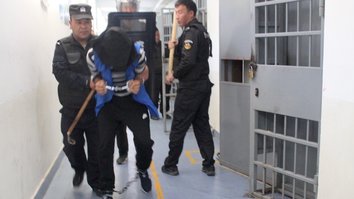Arab and Islamic countries and blocs must unify their position on China's repression of Muslims in Xinjiang and make a greater effort in brining the horrors to an end, clerics and academics in the Middle East said.
A grassroots campaign to hold China to account is also needed, they added.
Beijing is committing a litany of violations against Muslims in the northwestern region of Xinjiang, the only region in China with a majority Muslim population.
More than a million people, most of them Uighurs, have been arbitrarily detained in "political re-education" camps in the region.
![Uighurs and other Muslims rally in Istanbul in February, demanding justice for the crimes being committed in Xinjiang. [Yasin Akgul/AFP]](/cnmi_pf/images/2021/12/07/32990-000_93u8q7-585_329.jpg)
Uighurs and other Muslims rally in Istanbul in February, demanding justice for the crimes being committed in Xinjiang. [Yasin Akgul/AFP]
![Members of the Islamic Defender Front (FPI) participate in a rally in Indonesia in 2019 to show support for oppressed Muslims in China. [Chaideer Mahyuddin/AFP]](/cnmi_pf/images/2021/12/07/32991-000_1na5bv-585_329.jpg)
Members of the Islamic Defender Front (FPI) participate in a rally in Indonesia in 2019 to show support for oppressed Muslims in China. [Chaideer Mahyuddin/AFP]
![Police detain people after a rally in Hong Kong in 2019 to show support for oppressed Muslims in Xinjiang. [Dale de la Rey/AFP]](/cnmi_pf/images/2021/12/07/32992-000_1n94ma-585_329.jpg)
Police detain people after a rally in Hong Kong in 2019 to show support for oppressed Muslims in Xinjiang. [Dale de la Rey/AFP]
Independent investigations and interviews with former camp inmates have brought to light physical and mental torture, brainwashing, systematic rape and sexual abuse inside the camps, which effectively serve as prisons.
Additionally, Chinese authorities have used various pretexts to damage or destroy two-thirds of the region's mosques and other sacred Islamic sites, Human Rights Watch (HRW) said in a detailed report in April.
Yet the response of Muslim-majority Arab countries to these atrocities has been tepid, and some Arab leaders have even gone as far as taking China's side.
Saudi Arabia, the United Arab Emirates (UAE) and Egypt were among 37 countries that signed a 2019 letter to the United Nations Human Rights Council praising China for restoring "safety and security" in Xinjiang.
In a March 2019 resolution, focused on safeguarding the rights of Muslims living in non-Muslim countries, the Saudi-based Organisation of Islamic Co-operation (OIC) commended China's efforts "in providing care to its Muslim citizens".
HRW noted that the resolution "did not include a word of criticism or condemnation for Beijing".
Saudi Arabia, Egypt and the UAE also have arrested exiled Uighurs, deporting them to China at Beijing's request.
Muslim solidarity
Muslim clerics who spoke to Al-Mashareq said the best way to deter the Chinese government from continuing its mistreatment of the Uighurs is to organise grassroots campaigns and boycott Chinese goods.
Arab countries also must take a collective stance, through organisations and blocs such as the OIC and the Gulf Co-operation Council (GCC), to condemn China's repressive practices against its Muslim minority, they said.
"From a religious point of view, the duty of a Muslim is to support and help his Muslim brother if the latter is the victim of oppression," said Al-Azhar cleric Nayef Abd Rabbu, a professor of sharia and law at Al-Azhar University.
"Chinese Muslims are subjected to collective oppression merely because they are Muslims," he said, stressing that this is his own view, not the official position of Al-Azhar, which has hosted Uighur students from China for decades.
In recent years Al-Azhar has issued several statements in support of Muslims in China and Burma, Abd Rabbu said, including a 2015 statement criticising China for preventing Uighurs from fasting during Ramadan.
In the statement, Al-Azhar said it "rejects all forms of oppression imposed on Uighur Muslims in China".
Abd Rabbu said large-scale popular protests "will cause a change in the positions of governments or force China to back down from its actions to protect its interests".
Some point to the response that occurred in Afghanistan, where militants went so far as to call for all Muslims of the world to unite in 'jihad' against Beijing for its crimes.
Co-ordinated response
Mazen Zaki, director of new media at Egypt's Ibn al-Waleed Studies and Field Research Centre, has perused social media for news about Chinese Muslims.
He said he has seen a "massive wave of sympathy for them in Islamic countries, especially in the Middle East" but noted the lack of co-ordination and of "a unified campaign to get these voices heard at the highest levels".
Better co-ordination of hashtags, coupled with protests, could push Arab or Islamic governments to take a stance that would force Beijing to back down from its actions, Zaki said.
"China has extensive [economic] interests in the Middle East, in Islamic countries in particular," said Umm al-Qura University professor of comparative jurisprudence Abdullah al-Muqrin.
Countries could use this as leverage to pressure the Chinese government to back down from its actions towards Muslims, he said.
Al-Muqrin stressed the effectiveness of popular protests and the use of social media to share news of oppression against Chinese Muslims in pressuring governments to take a stance against China's actions.
"The positions of individual countries may not bring any significant result, unlike collective action by groups such as the OIC and the GCC," he added.
Societal responsibility
The Arab region is central to China's Belt and Road Initiative (BRI), a massive project launched in 2013 linking 78 countries across Asia, Africa, Europe and Oceania via railroads, shipping lanes and other infrastructure projects.
Through the BRI, China has offered loans to vulnerable countries, such as Iran, which will find them difficult to repay, thereby giving Beijing leverage over them.
These economic partnerships in some part explain why some countries are not speaking out about China's violations against Muslims in Xinjiang.
Al-Azhar cleric Sheikh Abdel Moneim Mohammed, imam of al-Nour mosque in al-Maadi, Egypt, said more attention needs to be given to the issue of Muslims in China.
"Many of the mosque goers I meet don't know anything about the subject and are even surprised that it is happening," he told Al-Mashareq.
Muslims have a societal responsibility to raise public awareness about the treatment of their brethren, he said.
"Grassroots campaigns may have a greater impact than governmental and official positions, such as a call for boycotting Chinese goods in the Middle East and Islamic countries," Mohammed said.
"If it materialises, it would be a painful blow to China," he said, since the Arab region is a major market for Chinese goods and a boycott would have a significant impact on the Chinese economy.

![Arab men protesting China's oppression of Muslims in Xinjiang. [David Furst/AFP]](/cnmi_pf/images/2021/12/07/32989-000_dv550500-585_329.jpg)






